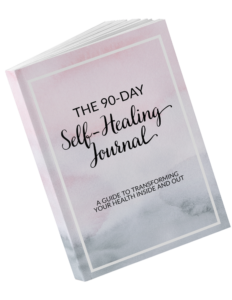This post contains affiliate links. I earn a percentage of sales made through my links.
In December 2017 the kindle version of my book, “The Complete Guide to Crohn’s Disease & Ulcerative Colitis: A Road Map to Long-Term Healing” was published, and in January 2018, the paperback was released.
This was, and still is a huge milestone in my life. Writing a book has been on my bucket list since I was a young child. In fact, I always dreamed of writing a children’s book one day. I never imagined my first book would be about my own personal and professional experiences or even be nonfiction for that matter.
However, sometime in the previous year writing a book had been in my mind. You see, the day I decided to start a blog, I was completely overwhelmed; unsure if I was putting too much of myself out there. As the lovely Liz Wolfe always says, “Putting things on the Internet is like peeing in a pool. You can’t get it back!”
Very quickly I realized blogging was the best decision I had made. I could reach so many more people with my message (as opposed to just having an Instagram account, which eliminates all of the people not on Instagram). But, I soon felt like I wanted to reach more and more people, and faster. With a web presence and social media covered, I went back to the basic way of communication: print.

In the spring of 2017 I committed to this book (quietly, in case I wanted to take back my idea, or work incredibly slowly). This overlapped with the time that I was enrolled in the Nutritional Therapy Association, earning my NTP certification, so I worked on it in spurts when I wasn’t working on assignments for the course.
Many of you have expressed your curiosity in how I wrote a book and managed to spread the word quickly. Since my book has been published, I have been interviewed on several podcasts, had my book accepted as a resource on the Crohn’s & Colitis Foundation’s online bookstore, and overall has been a way for new people to hear about my blog and business. Writing books is not only a great way to share your message or story, but it is a way to expand your network, build authority, and add another revenue stream. Let’s get into it so you can start your first book!
Choosing Your Book’s Mission and Chapters
First, you have be fully committed to writing a book. Not just the idea, but actually getting it done. It sounds extremely daunting, but Rome wasn’t built in a day and neither will your book! Whether it is a nonfiction, fiction, cookbook, or something else, sticking to this goal is an important first step.
Before you start writing, you want to clearly know what you want the readers to get out of the book. If you are writing a cookbook focused on family-friendly paleo dinners, you will want to keep this in mind with every recipe you create. For example, you wouldn’t want to use hard-to-find ingredients or ones that are very expensive.
I am a paper and pen kind of gal, so I recommend starting your book planning the old fashioned way.
Write the point of your book in the center of a piece of paper and circle it. Just like in school when you would make information webs, write the different topics that relate to your book’s goal. Write whatever comes to mind, even if you don’t use the ideas later. Don’t worry about being precise or repeating similar ideas. Use this as a brain dump that you can consolidate later.
These topics will form into your chapters (or if it’s a cookbook, maybe these are all the recipe ideas you have).
Now, you have just broken a HUGE task that is writing a book, into many smaller chapters. Doesn’t it already seem more doable?
TIP: Whenever you are unsure whether or not to include something in your book, think back to the point of the book. Is that chapter/recipe/story contributing to what the reader should get out of reading your book? If yes, then include it, if not, reconsider.
Outlining the Chapter Contents
Next, break down the chapters. You know what your general topic is for each chapter, so it’s time to figure out specifics. One way to do this is repeating the previous exercise, but for each chapter. So write the chapter in the middle of the page and brain dump everything you want your reader to get out of that chapter. Alternatively, you can do this in a list form.
After reviewing these to consolidate your ideas, these are the sub-topics that will fill the content in your chapters.
Now you have:
- The mission of your book
- Chapter ideas
- Details to fill your chapters
Voila, the backbone of your first book has been created.
Finding the Time to Write
It’s time to begin turning your notes into real sentences. If you feel overwhelmed, remind yourself that you are working on one chapter at a time. When you sit down, make a goal to write 3,000 words or to work for one hour straight.
I remember there were times I sat down to work but got distracted by an email or a text message and that derailed my productivity. When I set a time or work goal as I suggested above, I was always more successful.
Additionally, it’s a good idea to plan out these chunks of time in your schedule. If you don’t have a planner, I highly recommend getting one!
Whether it’s waking up 20 minutes earlier before work to get something done, or you have a weekday off from work you can dedicate solely to book writing, progress is progress. Even when I got a paragraph or two down, I felt good about getting closer to finishing.
TIP: Close out of all Internet tabs (except those for research purposes) and remove your phone from the room or turn to a setting that doesn’t allow interruptions. That way, you have nothing to check in with and no excuse to stop writing!
Outsourcing Help
I suggest hiring outside help for a few reasons.
- You need a cover design. Unless you are a graphic designer or have a job in a creative field, creating a book cover can be complicated. If you are able to create one, it may not be as professional looking as you would like. That is not to say that covers created by authors have never come out good, but if you want a sure-fire good-looking design and don’t want to deal with the technical part of it, hire out! I hired Danielle Christopher, and loved working with her. She was timely and provide me with options. I am so happy with my finished cover design!
- If you want to sell on Amazon, there are experts who have tricks of the trade. I worked extensively with Dr. Beth Brombosz, author, podcaster, editor, and more! She has many resources for authors through her platform, Blogger to Author. You can listen to her free podcast, browse her blog, buy her book on Amazon, take her course, and book consulting appointments with her. I wanted my book up for sale ASAP and I would rather outsource jobs to experts so I could have more time writing and marketing.
- You need someone to edit your book. Do not publish if only your eyes have scanned the copy. Even if you know you have great editing skills, in the very least have several friends read it over. I hired Beth as my copy editor and she returned my copy with many suggestions and corrections I was glad to have.
- You need a marketing strategy. Well, you don’t need one. It depends on your goals. If you are doing this for fun, make a few bucks in the process, and really just want to be able to hold the book and say you did it, feel free to skip this step. But if you are determined to get your book into as many hands as possible, consult with someone with experience and expertise in book marketing. Again, Beth was my lady!
I can’t get into the nitty-gritty of selling on Amazon because I can’t articulate it properly. Again, because I hired help I didn’t force myself to study everything having to do with selling a book on Amazon.
I can tell you that I did hire a book cover designer and I hired Beth for copy editing, a book marketing strategy consult, I bought her Blogger to Author course, and I listen to her podcast. She is a true wealth of knowledge, plus an amazing woman.
Miscellaneous Tips
- Everything takes longer than you think, including writing a book. If you predetermine your launch date, make sure you have given yourself and anyone else involved plenty of time to work.
- Whatever your goal for writing the book is, don’t expect it to be your main source of income. Unless you have Oprah status, that is! Books are a lot of work and it could be disappointing if you are expecting huge sales numbers for the hours you have put in. Of course, there is a lot you can do to improve your visibility (may I suggest a book marketing strategy with Beth?)
Overall, I am so glad I wrote a book and have plans to write more in the future for sure. It was a lot of work, but I am proud to say that I made it happen at 23 years old.
So tell me, are you feeling inspired to get your book going? I want to know what kind of book you are going to write!






